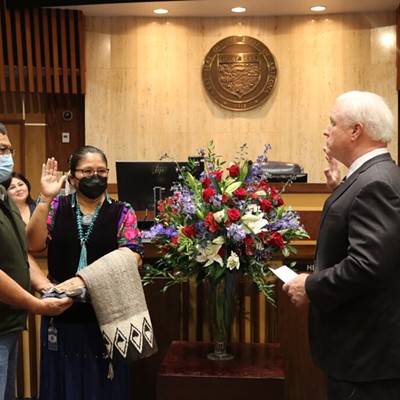Thursday, February 17, 2022
The Daily Agenda: Every Day Is January 7

The election fallout is election fodder … He’s an expert on ethics rules … And please buy us a water slide.
The U.S. House’s January 6th committee subpoenaed two more Arizonans this week. It wasn’t the first time the committee subpoenaed or sought depositions with Arizonans tied to the Jan. 6 insurrection and the events leading up to it, and it probably won’t be the last.
This time, the committee sought records and depositions with Arizona Republican Party chair Kelli Ward and Arizona Rep. Mark Finchem as it looks further into the fake electors who sent documents claiming Trump won the 2020 election in their states.
In a letter to Finchem, the committee cited his public comments about the election being stolen or rigged, as well as a meeting in Phoenix where Finchem met with Trump’s legal team where he made false claims about the election. The committee also noted Finchem’s presence in Washington on Jan. 6.
As for Ward, the committee called out her texts asking an election official to “stop the counting” and her actions as one of the fake electors, among other claims she made about the election.
We’ve talked a bit about the Jan. 6 committee, its Arizona ties and the fake electors plot over the past couple months — it has clear that the fake electors issue resurged recently because of the committee’s work to understand who set up the fake electors plan, any coordination between Trump and the actions some states took to try to usurp the voters.
The committee subpoenaed two others who signed on as fake electors in Arizona in late January. The fake electors plot continues to surface on news networks seemingly daily, like on MSNBC’s Rachel Maddow Show, for instance, which reported that Arizona Rep. Jake Hoffman, one of the fake electors, reached out to former Vice President Mike Pence on Jan. 5, 2021, about the slate of electors and asked him to delay the certification.
The citations in the subpoena letters make one thing clear: Much of these efforts to undermine the election happened in public. While the committee’s work has brought new light or backstory to some issues, attempts to overturn the election weren’t private. They happened in meetings, on social media, with fake slates that the state party shared online. Before they started no-commenting, the fake electors were very proud of what they had done.NEW: January 5 letter from Arizona fake elector to Mike Pence asks Pence to delay certifying the election and consult Arizona legislature on considering fake Trump electors instead. pic.twitter.com/kKr1WEOBXc
— Maddow Blog (@MaddowBlog) February 16, 2022
The fallout of the 2020 election remains ever-present in Arizona. The Arizona Supreme Court prepares to hear an audit-related case about records and legislative privilege, while Doug Logan, former top ninja, said he’d maybe be able to produce some records if the Arizona Senate paid him.
We’ve gone over and over the 2020 election so many times, the topic stayed in the news for well over a year now, and still there’s little resolution. The audit proved nothing to no one, but it did provide some campaigners with more material. People stay convinced of whatever they were convinced of on Nov. 3, 2020. And those suppositions will likely change Arizona law in a way that further restricts voting.
And while getting subpoenaed is never fun, it’s not like the work of this committee is being taken seriously by the people the committee wants to talk to. Take Finchem’s response to the letter, for example:
Kangaroo court speaks. LOL. 🤣 https://t.co/REbfrnUZSd
— Mark Finchem (@RealMarkFinchem) February 16, 2022
We’re left wondering what the committee’s work will amount to, though that’s not to say Jan. 6 isn’t worth investigating. But will the people, especially those in positions of power, be held accountable for their actions? Will there be changes to laws or policies that seek to prevent a repeat of 2020 and its aftermath? Or will it all just become campaign fodder for both sides?
Public vs. private practice: The Arizona Supreme Court, which oversees the State Bar of Arizona, formed a task force that will decide if ethical rules should be adjusted for public lawyers like the attorney general and county attorneys. The task force announcement comes after Attorney General Mark Brnovich entered into a Bar agreement to resolve ethical complaints; Brnovich said the court should reexamine the role of public attorneys and how they may differ from private practice. The task force will be chaired by Justice Bill Montgomery, the former Maricopa County Attorney, who has himself faced an ethics investigation which was ultimately dismissed. The task force will start its work next month and is expected to present its results and recommendations by the end of the year.
Were you charged on Monday?: Defense attorneys are starting to ask the obvious question of whether Maricopa County Attorney Allister Adel was drunk when she signed off on charges against their clients, ABC15’s Dave Biscobing notes.
Now that’s leadership: Senate President Karen Fann is still one Republican vote short of passing legislation to lift the education cap and save schools from a disastrous end-of-year budget cut. Out of 16 Republicans in the chamber, only five appear to support the measure, per the Arizona Mirror’sJeremy Duda’s tally.
Good morning from the pillow man pic.twitter.com/u8ce2RG5iF
— Clue Heywood (@ClueHeywood) February 16, 2022
What’s old is news again: The Arizona Court of Appeals breathed new life into a 2019 lawsuit from liberal groups claiming lawmakers attending the American Legislative Exchange Council (ALEC) junkets break open meetings laws, saying open meeting laws apply to them, too. A divided three-judge panel also rejected lawmakers’ argument that they’re not really doing public business at ALEC, Capitol scribe Howie Fischer writes. They kicked the case back to the trial court.
Get well soon: Former U.S. Rep. Gabrielle Giffords has appendicitis, and her husband, current U.S. Sen. Mark Kelly, left D.C to be with her in Tucson, the Associated Press writes.
It’s called the stack because the cars stack up in accidents: 12 News’Michael Doudna sorted through traffic data to find the most crashable stretch of highway in the state. Experts were not shocked that it’s right where I-10, Loop 202, and State Route 51 converge.
We know you all probably love our little pitches for money every day, but take it from esteemed journalist Fernanda Santos instead: You should become a paid subscriber.
Major props to the Arizona Agenda dynamic duo @rachelleingang and @hankdeanlight for the outstanding newsletter and their creative push for subscriptions. Worth skipping a latte for a day for a smart-and-fun monthly dose of AZ political news.https://t.co/KPwxxfWELP pic.twitter.com/fwtQbF7yCT
— Fernanda Santos (@ByFernandaS) February 16, 2022
So many bills, so little time: A pro-dog, anti-firework bill passed the House; the Senate passed a bill to criminalize abortions after 15 weeks; more ivermectin, fewer vaccines, they say; a plan to fill legislative vacancies that wouldn’t include county boards of supervisors.
Yes, that liberal Maricopa County: A plan to split Maricopa County into four new counties received preliminary approval after GOP gubernatorial candidate Steve Gaynor testified that breaking it into pieces would stop it from becoming a “liberal, terribly-run megacounty.” Fake elector Twitter persona non grata and bill sponsor, Rep. Jake Hoffman, claims it has nothing to do with the election.
Hoffman: "Any attempt to paint this as retaliation or retribution toward the county is pure conspiracy theory. ... To say that this has anything to do with the election is laughable and nothing more than a conspiracy theory." Says breaking up Maricopa has been proposed before.
— Nathan Brown (@NateBrownNews) February 16, 2022
If he could turn back time: Republican Rep. John Fillmore said he wants to take Arizona back to 1958-style voting, and the Republic’s Ray Stern dove into just how racist voting was pre-Civil Rights Act. And there’s a racist cameo from former U.S. Supreme Court Justice and Arizona lawyer William Rehnquist.
A rare example of when referencing the Holocaust is OK: The ACLU and Jewish community groups are suing to try to stop Arizona from using lethal gas in death penalty cases, saying it constitutes cruel and unusual punishment, the Republic’s Jimmy Jenkins reports. Arizona recently tried to use the same type of cyanide gas to put inmates to death as was used at Auschwitz.
Speaking of ACLU lawsuits: The ACLU’s class-action lawsuit against the Phoenix Police Department and the city regarding excessive force and First Amendment infringement at an anti-Trump demonstration in 2017 is going to trial, Phoenix New Times’ Elias Weiss reports. That was the protest Phoenix Police celebrated with the “good night left nut” challenge coins. The suit comes as the Phoenix Police Department is under a U.S. Department of Justice investigation into all sorts of practices in the department, including excessive force.
The ACLU sure is busy these days: In new filings in its ongoing lawsuit against theMaricopa County Sheriff’s Office over the lack of COVID-19 mitigation efforts in jails, the ACLU argues that prisoners in Maricopa County jails are not able to get the COVID-19 vaccine, Phoenix New Times’ Katya Schwenk reports.
Sweetening the pot: In an effort to increase the number of places for low-income Arizonans to live, the City of Phoenix hopes to entice landlords with a $500 bonus if they accept Section 8 housing vouchers, the city said yesterday. Because the price of housing keeps increasing in Phoenix, landlords often choose to make more money than a voucher could provide, the Republic’s Jessica Boehm reports.
Kind of like a birthday party, but in reverse: It’s a celebration of demolishingan old, defunct Village Inn.
A few years back, lawmakers created a study committee to look at ways to protect vulnerable adults. One of the recommendations from its final report is going before the full House today for a vote.
House Bill 2397 from Republican Rep. Tim Dunn would create the new crime of “emotional abuse” defined as a pattern of ridiculing, demeaning or making derogatory remarks to a vulnerable adult.
Tempe’s longtime wave pool and slide attraction, Big Surf Waterpark, is apparently up for sale, and so are the stuff that was inside. You can buy a part of a waterslide or a surfboard, two things you really need in Arizona.
We don’t have enough money to buy a waterpark, but we’re going to propose that we make Big Surf the new Arizona Agenda headquarters anyway. At the very least, we need ourselves a used boogie board.



















